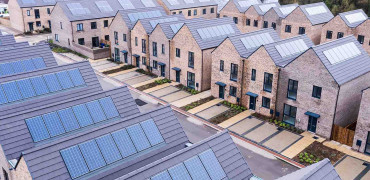The spiraling cost of living has rising energy prices at its heart.
People on low incomes, often those living in social housing, feel the burden of this as a high proportion of their earnings goes on heating and hot water.
Is there a way to ease the financial cost?
Geopolitical events, sometimes leading to conflict and war, often result in higher oil and gas prices.
And when prices rise, households must tighten their belts.
While we cannot affect global tension between states, as a nation, collectively and individually, we can wean ourselves away from an addiction to fossil fuels.
Car drivers, for example, are increasingly turning away from petrol and diesel to electric vehicles.
The project saw savings of over 50% in heating costs and an 81% reduction in CO2 emissions
Less carbon and lower bills
Similarly, in heating, as an alternative to fossil fuel boilers, there is a move to technology that is more efficient, better for the environment and could offer cost savings for households – namely heat pumps – which is particularly attractive to those in social housing.
Increasingly housing associations are choosing to install heat pumps rather than gas boilers for their tenants. For many, providing heat pumps meets their ambitions to decarbonise home heating and lower their tenants’ energy bills.
Housing associations and local authorities provide almost 20% of the UK’s housing stock, housing almost 6 million people, and home heating accounts for up to 17% of the UK's carbon emissions.
A switch to more sustainable heating offers opportunities to counter the cost-of-living crisis, decarbonise home heating, makes us less reliant on oil and gas, and get us closer to achieving net zero.
Across the country
Cottsway Housing Association in Oxford opted for Ecodan heat pumps when it decided to install an advanced and efficient heating system, to replace gas boilers, storage heaters and open fires, for their residents. One of the association’s objectives was to lessen the impact on the environment and save money on energy bills.
Similarly, Sovereign Housing Association residents, Anne and Alan, had an Ecodan heat pump installed to their property replacing their night storage heaters that they struggled to afford. This helped the couple save approximately £700 a year on their electric bill whilst gaining more heat and comfort.
Residents of Clydesdale Housing Association development benefitted from an annual saving of £852 with the installation of Ecodan heat pumps.
And the Hightown Housing Association’s Bowling Court refit project with Ecodan units resulted in savings of over 50% in heating costs, an 81% reduction in CO2 emissions and the EPC rating raising to B.
Rising to the challenge
As Britain’s largest manufacturer of heat pumps, Mitsubishi Electric is similarly ambitious as housing associations to reduce carbon emissions. To this end we recently launched our newest and innovative Ecodan model, the R290.
With its lower global warming potential (GWP) refrigerant, The Ecodan R290, is a major step towards more sustainable home heating. Using a hydrocarbon refrigerant that can achieve high Coefficient of Performance (COP) values greater than four in heating mode, means higher heating performance. With a cost-of-living crisis, this means enhanced energy savings and reduced operational costs for a household.
The R290 is a high temperature heat pump that matches a traditional gas boiler – even when it’s -15°C outside it can reach a high heating temperature of 75°C. Such a capability means that a house can be warmed very effectively, and water can be heated to a high temperature to provide plenty of hot water for a large family.
Limited disruption
Reaching this high level of heat will be particularly attractive for housing associations. It means that they can install an R290 heat pump, for example in a retrofit project, and potentially keep the home’s existing radiators and pipe work.
Importantly, for the tenants, as well as reduced energy bills, it also means limited disruption.
The volatility in the fossil market and with calls for energy security in a cost-of-living crisis, makes heat pumps the default technology for home heating and hot water.
It means that housing associations and households don’t have to be addicted to oil and gas heating and they can enjoy lower energy bills in their decarbonised home.
James Chaplen is Head of Product Marketing & Communications, Residential Product Group,




